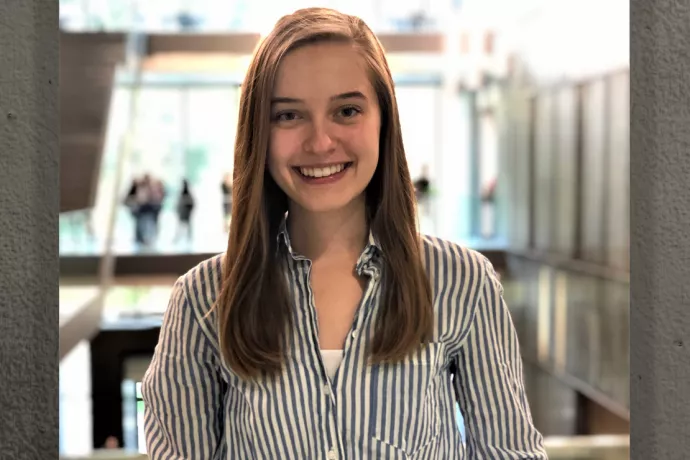UTM student wins two prestigious graduation awards

Recent University of Toronto Mississauga graduate Rachel Stubits was settling in to check her emails when she saw a message related to graduation awards. She opened it to see if she recognized this year’s recipients for the Governor General’s Silver Medal and John Black Aird Scholarship – and there it was on the screen:
“Dear Rachel Stubits, Congratulations!”
To her delight, she received both the medal and the scholarship, which are awarded annually to recognize top U of T students.
“When I saw that I was the recipient, the weight of everything suddenly dawned upon me,” says Stubits.
“It was honestly – no exaggeration – the happiest moment of my life to date, because it came as such a surprise and these are really tremendous awards.” Both awards recognize top undergraduate marks. Only one scholarship is awarded each year, while only a handful of undergrad students receive the medal annually across the three campuses. “I know that there are so many students who have done phenomenal work throughout their undergraduate studies. I just felt really deeply humbled.”
She joked that wearing her favourite U of T sweatshirt when she found out about the awards might have brought her luck, but this student definitely earned her success: a perfect 4.0 GPA studying molecular biology with a minor in chemistry, while also being involved in several other initiatives on and off campus.
Although she participated in a range of research projects, including one on cavities in space, Stubits has primarily thrived in UTM’s Department of Biology with faculty members such as Fiona Rawle serving as educators as well as mentors.
Stubits’ first research experience was through a Research Opportunity Program with Rawle.
“Our project, which focused on misconceptions surrounding antibiotic resistance, helped me build foundational skills that I continue to use to this day.”
Stubits states that she continues to draw not only from the research experience that she gained from that role, but also from the classroom lessons she learned from Rawle.
“She taught me to view failures as learning experiences instead of dead-ends, and she helped me appreciate the importance of being competitive with myself and collaborative with others.”
Over this last year of her UTM studies, she undertook a project for her undergraduate thesis under the direction of biology professor Marcus Dillon, employing computational biology to study the characteristics of a particular type of bacteria that negatively impacts agricultural crops.
“He was incredibly knowledgeable and supportive,” Stubits said of Dillon. “He fostered a culture of mutual support, respect, and kindness in the lab.”
Although her thesis is now complete, she is continuing to work on this project in the Dillon Lab throughout the summer.
Stubits says that she first became interested in science because of health-related issues she began to encounter during high school. She remembers feeling shocked “to realize that small changes to cells and their components could cause such large-scale changes to an organism,” and this interest inspired her to study molecular biology. Stubits’s passion for science was reignited in university because her professors made her courses “engaging and fun” by weaving in “real-world applications” and fostering a learning environment where students could “lean into (their) curiosity.”
Giving back and getting involved
Throughout her studies at UTM, she volunteered with Community on Campus, a program at UTM that supports individuals with intellectual disabilities as they gain a university experience. For several years, Stubits also worked as a Program Assistant with both the Robert Gillespie Academic Skills Centre Facilitated Study Group Program, as well as the Peer Mentoring Learning Community (PMLC) Program, which is jointly run by RGASC and UTM’s Accessibility Services that assists students with disabilities.
She feels she has made lasting connections here and that being involved in these programs was an opportunity for her to share some of what she has learned along the way. Stubits drew from her own experiences navigating university with a disability while working for the PMLC Program.
“I hope that the PMLC Program is a safe space where students with disabilities can reflect on the hurdles they have needed to jump over during their studies, and also advocate for systemic changes that would dismantle those barriers.”
Stubits credits a support network that includes her UTM mentors in biology and beyond, UTM Accessibility Advisor Teresa Jose, along with her parents, her boyfriend Sam, her best friend Anisha, and her uncle Rob for their collective “wisdom, kindness, and support.”
Finding the way forward, at UTM
This is not the end of Stubits’ UTM journey: in August, she will start her first year at the Mississauga Academy of Medicine. Along with the “home away from home” feeling she has established at UTM, she is looking forward to the clinical placements she will undertake as part of the program with Trillium Health Partners and at Credit Valley Hospital where she has been a patient as well as a volunteer.
Stubits has weathered health challenges, not to mention the shifts that the pandemic presented, throughout her time at UTM, and she encourages other students to prioritize their health and well-being, practice self-compassion, find creative ways to connect with their community, and recognize that the way forward is not always a straight line.
“I took an entire year off my undergraduate studies to recover from surgeries, and over the years, I have dropped more classes than I can count,” says Stubits.
“However, I found it easier to mould my studies to my needs rather than mould myself to my preconceived notion of what a ‘normal’ undergraduate journey looks like. Although I wish I maintained more optimism along that path, looking back on it, I can see that this convoluted journey was exactly what I needed to get to where I am today.”



